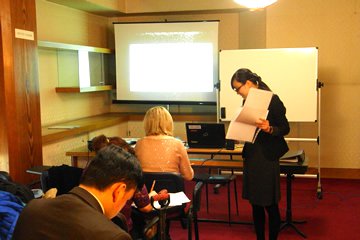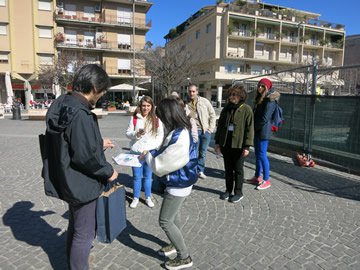2017 Japanese-Language Assistants’ Report: Studying and Connecting with Learners in Japanese-Language Courses
The Japan Cultural Institute in Rome
INDO Reiko
The Japan Cultural Institute in Rome (hereafter referred to as "the Institute") is located in the quiet Parioli district, in the north of the eternal city of Rome. I would like to introduce the work of the Japanese-Language Assistant (hereafter referred to as "Assistant") working diligently on Japanese-language courses, of which there are 18 courses with about 350 students (as of April 2017) who are all excited and eager to learn in contrast to the calm atmosphere of the district.
Japanese-Language Courses and Classes I Teach in the Institute
The following four courses are available: Afternoon General (3 hours per lesson x 2 times per week), Evening (2 hours per lesson x 2 times per week), Saturday (2 hours per lesson x 1 time per week), and Advanced (2 hours per lesson x 1 time per week).
Of these, the Assistant teaches four classes a week, most of which are intermediate classes. In the intermediate level, learners feel less of a sense of accomplishment than in the beginner level, and their motivation gradually decreases. Many of the students in the class I was in charge of were also feeling anxious about their lack of progress.
To motivate my students, I decided to conduct an activity called "My Own Phrase" in every class to give them some sense of accomplishment, no matter how small. In this activity, students choose five words or phrases from the class that they would like to use in the future, memorize them at home, and test them in the next lesson. At first, they complained, saying, "It's impossible to acquire vocabulary through the activity," but after many weeks of perseverance, they are now able to remember many words and phrases. Learning the language has given them confidence, and they are willing to take on difficult challenges in class. Of course, I need to teach classes, but I feel that I need to gain more experience as a teacher so that I can think from the students' perspective and support them in solving their problems. For the remainder of my term, I would like to cultivate my skills, especially in problem-solving support.

Class of Japanese-language course
Students' Talents Revealed through the Portfolio Competition
Another job of the Assistant is to assist in the administration of the courses. For this, I would like to introduce a new initiative, the Portfolio Competition (hereafter referred to as "Competition").
A portfolio is a tool for learners to keep a record of their own learning, consisting of (1) a "Can-do" sheet, (2) learning achievements, and (3) records of linguistic and cultural experiences.
The students in the course, even if they had created portfolios before, had never displayed them as learning achievements. In addition, some instructors have told us that they have wonderful student portfolios but do not have the opportunity to show them, so we decided to hold the Competition in the second semester of the 2016-2017 academic year (February to May 2017).
The duties of the Assistant at the Competition were to prepare an outline and discuss with Japanese-Language Specialists how to notify and judge the students. With the help of the instructors of each class, the most outstanding portfolio was selected for the Excellence Award. Furthermore, we are planning to select the Grand Prize winner from among the Excellence Award winners for the completion ceremony in June.
In the portfolio, especially (3), records of linguistic and cultural experiences showed a high level of interest in Japanese culture, and many of the methods of expression were unique to Italy, the land of art. I believe that both the instructors and students were able to discover new charms and talents not limited to Japanese through the Competition. That can be said to be an unexpected outcome of the Competition. In the future, I would like to increase what I can do in terms of administration so that the Competition can become a source of further stimulus for the Japanese-language course.
Wai Wai Shaberiamo (Let's chat)
The Japanese conversation group "Wai Wai Shaberiamo" (hereafter referred to as "Shaberiamo") is held once a month at the Institute. Shaberiamo is an event where Italians and Japanese chat about certain topics, and people who are studying Japanese but have few opportunities to interact with Japanese people in their daily lives can meet and talk with Japanese people.
The average number of participants is about 30 Italians and about 10 Japanese. Perhaps due to the recent decrease in the number of Japanese living in Rome or staying there for a long period of time, the number of Japanese participants in Shaberiamo is decreasing, which is a challenge. As a countermeasure, we would like to approach Japanese travelers to increase the number of participants.
Normally, Shaberiamo is held at the Institute, but a special project, "Shaberiamo Caravan" was held in March 2017, and we went on a field trip to a town called Tivoli near Rome.
During the field trip, Japanese and Italians worked in groups of five or six to make a Japanese tourist map. At first, the group activities were a bit awkward and, as an organizer, I was worried, but after a few hours of group activities, bonds were formed, and by the end, the group had become very close and were speaking in Japanese, which was impressive.
I think the charm of Shaberiamo is that it creates a bond between Japanese and Italians through the Japanese language. I would like to continue to provide projects that create bonds through Shaberiamo.

Shaberiamo Caravan
- What We Do Top
- Arts and Cultural Exchange [Culture]
- Japanese-Language Education Overseas [Language]
- Japanese-Language Education Overseas [Language] Top
- Learn Japanese-language
- Teach Japanese-language
- Take Japanese-Language Test
- Know about Japanese-language education abroad
- The Japanese-Language Institute, Urawa
- The Japanese-Language Institute, Kansai
- Japanese-Language Programs for Foreign Specified Skilled Worker Candidates
- Japanese Language Education for Japanese Children Resident Overseas and for the Descendants of Migrants
- Archives
- Japanese Studies and Global Partnerships [Dialogue]
- JF digital collection
- Other Programs / Programs to Commemorate Exchange Year
- Awards and Prizes
- Publications
